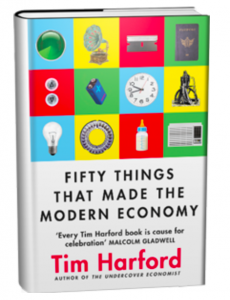 Fifty Things that Made the Modern Economy by Tim Harford
Fifty Things that Made the Modern Economy by Tim Harford
Little Brown, 2017
Hardback
ISBN 978-1-4087 – 0911-5
Great Read, but Something Missing
Tim Harford has written a very readable and enjoyable introduction to Fifty Things that made the Modern Economy. He includes lots of things it’s easy to take for granted, but have actually been very significant, e.g. barbed wire, air conditioning, the shipping container, barcodes, elevators, plastic and intellectual property. My conviction that we are much in our debt to the inventors, investors and entrepreneurs who pioneered these developments was strongly reinforced. Harford happily mixes amusing anecdote with astute analysis of each invention’s pros and cons.
A key theme is that inventions per se don’t change the world; they need to be integrated into a system, and this often requires a revolution in corporate and public mindset as to how things are done. As Harford says, ‘changing everything takes time, and imagination and courage – and sometimes just a lot of hard work’. It also often requires government support – the iPhone depends on 12 key technologies to make it work, and the US government has been involved in developing most of them. Global advance in certain areas has been frustratingly slow. With their belated adaptation of Alexander Cumming’s invention the S-Bend, the Victorians cracked the problem of public sanitation in this country after the Great Stink of 1858 made it impossible for Parliament to ignore. Yet 2.5 billion people in the world still lack proper toilets.
If I have a regret about the book, it is that Harford is so absorbed with the economic mainstream that he neglects alternative business models which prioritise not the making of money but the welfare of shareholders others than investors or customers. Admittedly, these only form a small part of the global economy, but it is a growing one. And there are some good historical stories he could have told – such as George Cadbury building a garden estate for his workforce in Bournville, or John Spedan Lewis devising a partnership model of corporate ownership. So a great read, but still something missing.